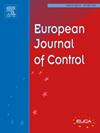Optimization of robotic shaping control for non-rigid material with safety constraints
IF 2.6
3区 计算机科学
Q2 AUTOMATION & CONTROL SYSTEMS
引用次数: 0
Abstract
Robotic milling has emerged as a prominent research area for complex shaping owing to the inherent flexibility of manipulators. The investigation of robotic milling for rigid material has widely reported. However,because of the inherent attribute of rigid material, these methods mainly concentrate on the position and pose control of manipulators during task processing, lacking of reaction to material state, such as temperature and elastic deformation. This oversight becomes problematic when dealing with nonrigid materials since milling objectives are highly sensitive to changes in temperature and deformation. As a consequence, current robotic milling approaches designed for rigid materials may fail to ensure processing accuracy and security in such scenarios. To deal with this issue, this paper constructs a robotic milling simulation environment that incorporates a joint multi-fidelity surrogate model for nonrigid material milling with the consideration of temperature and deformation information. By means of reinforcement learning strategies to learn the knowledge of nonrigid material milling process, the elastic deformation can be effectively compensated and the temperature can be restricted within the preset bound while ensuring the processing efficiency. Finally, the effectiveness of the proposed control approach for nonrigid material milling is verified through simulation and experiment results.
具有安全约束的非刚性材料机器人成形控制优化
由于机械手固有的灵活性,机器人铣削已成为复杂成形的一个重要研究领域。机器人铣削硬质材料的研究已被广泛报道。然而,由于刚性材料的固有属性,这些方法主要集中在任务处理过程中机械手的位置和位姿控制,缺乏对材料状态(如温度和弹性变形)的反应。当处理非刚性材料时,由于铣削物镜对温度和变形的变化高度敏感,这种疏忽就成了问题。因此,目前为刚性材料设计的机器人铣削方法可能无法确保在这种情况下的加工精度和安全性。为了解决这一问题,本文构建了考虑温度和变形信息的非刚性材料铣削联合多保真度代理模型的机器人铣削仿真环境。通过强化学习策略学习非刚性材料铣削过程的知识,在保证加工效率的前提下,有效补偿弹性变形,将温度控制在预设范围内。最后,通过仿真和实验结果验证了所提控制方法对非刚性材料铣削加工的有效性。
本文章由计算机程序翻译,如有差异,请以英文原文为准。
求助全文
约1分钟内获得全文
求助全文
来源期刊

European Journal of Control
工程技术-自动化与控制系统
CiteScore
5.80
自引率
5.90%
发文量
131
审稿时长
1 months
期刊介绍:
The European Control Association (EUCA) has among its objectives to promote the development of the discipline. Apart from the European Control Conferences, the European Journal of Control is the Association''s main channel for the dissemination of important contributions in the field.
The aim of the Journal is to publish high quality papers on the theory and practice of control and systems engineering.
The scope of the Journal will be wide and cover all aspects of the discipline including methodologies, techniques and applications.
Research in control and systems engineering is necessary to develop new concepts and tools which enhance our understanding and improve our ability to design and implement high performance control systems. Submitted papers should stress the practical motivations and relevance of their results.
The design and implementation of a successful control system requires the use of a range of techniques:
Modelling
Robustness Analysis
Identification
Optimization
Control Law Design
Numerical analysis
Fault Detection, and so on.
 求助内容:
求助内容: 应助结果提醒方式:
应助结果提醒方式:


